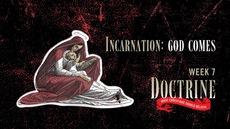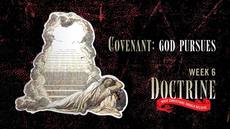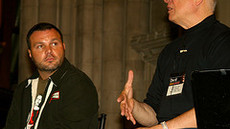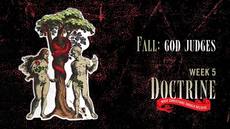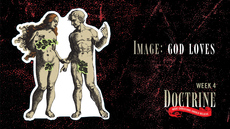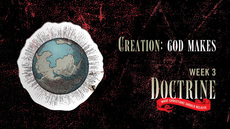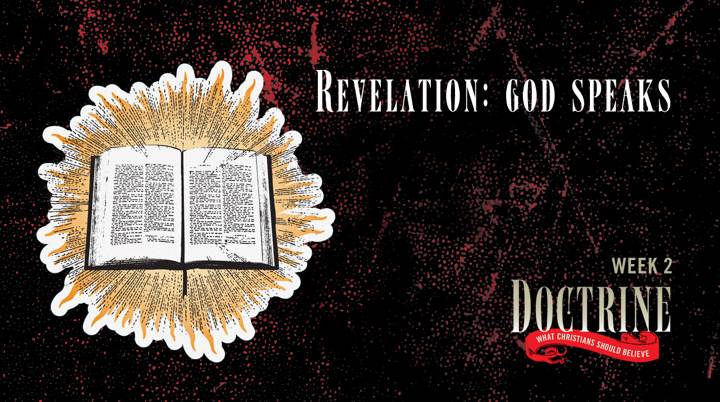
On Sunday April 6 I spoke on
Revelation: God Speaks as the second sermon in our
Doctrine: What Christians Should Believe series. The big idea, building off the first week’s sermon on the Trinity, is that God communicates. For example, we read, "God said" ten times in Genesis 1 alone. For further reading on the topic of revelation, I have to new books coming out this summer:
On the Old Testament and
On the New Testament. Each is short enough to be read in about an hour.
What is revelation?
No one is born with a clear comprehension of who God is. So, in an effort to know about God, various philosophers and religious leaders have presented their speculations about God with seemingly endless and contradictory declarations.
God has chosen to lift the fog of human speculation with divine revelation. Whereas speculation is the human attempt to comprehend God, revelation is God’s communication to humanity with clarity that is otherwise impossible. The object of that revelation is the sixty-six books of Scripture.
- General Revelation (Ps. 19:1–4; 94:8–10; Rom. 1:19–21): the personal act of God by which he makes himself known to humanity in general through his creation, providence, and conscience so that they might come into relationship with him.
Calvin on general revelation: "God not only has sowed in our minds that seed of religion but revealed himself and daily discloses himself in the whole creation and preservation of the universe. As a result, humans can not open their eyes without being compelled to see God." (Inst. I, V, 1)
- Special Revelation (2 Tim. 3:16; Heb. 1:1): the personal act of God by which he makes himself known to many people by his redemptive word-work so that they might come into relationship with him.
What are the Scriptures?
The New Testament speaks of the Old Testament as Scripture, for which the Greek word is graphe, meaning "writing." The word bible comes from the Greek word for book. Holy Bible, therefore, means "Holy Book."
The Bible actually contains sixty-six separate books. Thirty-nine books are in the Old Testament, which is a record of time from God creating the world and our first parents Adam and Eve up until the coming of Jesus Christ into human history. The twenty-seven books of the New Testament begin with the four gospels, which record the life, death, burial, resurrection, and return to heaven of Jesus, and then proceed to instructions to various Christians and Christian churches about how to think and live in light of who Jesus is and what he has done. In this way, the Bible is really more of a library of books rather than a single book. However, there is unity and continuity between the various books of the Bible and their Old Testament and New Testament groupings. This point is illustrated by the fact that the New Testament has roughly three hundred explicit Old Testament quotations, as well as upwards of four thousand Old Testament allusions. In many ways, the Old Testament is a series of promises that God makes and the New Testament is the record of the fulfillment of those promises.
For these, and innumerable other reasons, the Bible is the bestselling book of all time, and is now available in nearly three thousand languages. However, when you pick up a Bible, while its content will be the same as the ancient version, there are a few differences. The Old Testament was written on papyrus—a form of paper made out of reeds; the New Testament was written on parchments (prepared animal skins). A lecturer at the University of Paris created the Bible's chapter divisions in the early 1200s, which accounts for our current 1,189 chapter divisions. Its current 31,173 verse divisions were not fully developed until 1551, in an effort to provide addresses (not unlike those on our homes) that would help us find particular sections.
Roughly three-quarters of the Christian Bible is the Old Testament. The Old Testament has 929 chapters and 23,214 verses. The New Testament has 260 chapters and 7,959 verses. In the Old Testament, the longest book is Psalms and the shortest book is Obadiah. In the New Testament, the longest book is Acts and the shortest book is 3 John.
What does Jesus say about the Scriptures?
Jesus summarized the Old Testament Scripture as existing in three parts: the Law, Prophets, and Psalms (Luke 24:44). He accepted the Old Testament canon as it exists today without any modifications and came to fulfill it (Matt. 5:17). As a rabbi, or preacher and teacher of Scripture, Jesus’ entire ministry involved the instruction and application of the Old Testament. Jesus’ public ministry even began with him reading from the Old Testament book of Isaiah and stating that his ministry was to fulfill the Old Testament promises about his coming (Luke 4:16–21). Jesus clearly stated that his ministry was an Old Testament ministry; it was to fulfill all of the Old Testament promises and longings that pointed to him.
Following his return to heaven, Jesus’ students wrote the remaining books of Scripture and likewise upheld Scripture as God’s unique, perfect, authoritative, helpful, and powerful revelation to humanity. The New Testament writers claimed that the Old Testament is sacred Scripture (Matt. 21:42; 22:29; 26:54, 56; Luke 24:25–32, 44–45; John 5:39; 10:35; Acts 17:2, 11; 18:28; Rom. 1:2; 4:3; 9:17; 10:11; 11:2; 15:4; 16:26; 1 Cor. 15:3–4; Gal. 3:8, 22; 4:30; 1 Tim. 5:18; 2 Tim. 3:16; 2 Pet. 1:20–21; 3:15–16). Furthermore, the New Testament authors quote the Old Testament roughly three hundred times.
In summary, Jesus taught that the Old Testament was perfectly inspired and totally truthful Scripture. Jesus devoted his ministry to teaching the Old Testament, defending the Old Testament, fulfilling the Old Testament, and using the Old Testament.
Who wrote the Bible?
The belief that God wrote Scripture in concert with human authors whom he inspired to perfectly record his words is called verbal (the very words of the Bible) plenary (every part of the Bible) inspiration (are divinely inspired revelation). Very simply, this means that God the Holy Spirit inspired not just the thoughts of Scripture, but also the very details and exact words that were perfectly recorded for us as Scripture.
This doctrine is inextricably tied to the character of God himself. God is a truthful God who does not lie (Heb. 6:18; Titus 1:2). Therefore, because God is ultimately the author of Scripture, it is perfect, unlike every other uninspired writing and utterance.
Scripture claims to be God-breathed or inspired: "All Scripture is breathed out by God and profitable for teaching, for reproof, for correction, and for training in righteousness, that the man of God may be competent, equipped for every good work" (2 Tim. 3:16–17). Peter says, "the prophets who prophesied about the grace that was to be yours searched and inquired carefully, inquiring what person or time the Spirit of Christ in them was indicating when he predicted the sufferings of Christ and the subsequent glories. It was revealed to them that they were serving not themselves but you, in the things that have now been announced to you through those who preached the good news to you by the Holy Spirit sent from heaven, things into which angels long to look" (1 Pet. 1:10–12). Peter also says that "no prophecy of Scripture comes from someone’s own interpretation. For no prophecy was ever produced by the will of man, but men spoke from God as they were carried along by the Holy Spirit" (2 Pet. 1:20–21).
Christians believe that Scripture is our highest authority, or metaphorical Supreme Court, by which all other lesser authorities are tested. Practically, this means that lesser courts of reason, tradition, and culture are under the highest court of truth, which is divinely inspired Scripture. During the Protestant Reformation, the slogan sola scriptura (and sometimes prima scriptura) became popular to summarize this conviction; it means Scripture alone is our highest authority. This should not be confused with solo scriptura, which is the erroneous belief that truth is only to be found in Scripture and nowhere else. Scripture itself tells us that God reveals truth to us in such things as creation and our conscience, but that the beliefs we may subscribe to from such forms of lesser revelation are to be tested by Scripture.
Why are there different Bible translations?
I have previously written a lengthy paper answering this question, which can be found
here.
What is the canon of Scripture?
The English word canon goes back to the Greek word kanon and then to the Hebrew word qaneh.
According to Neil R. Lightfoot, "Its basic meaning is ‘reed,’ and our English word ‘cane’ being derived from it. Since a reed was sometimes used as a measuring rod, the word kanon came to mean a standard or rule. It was also used to refer to a list or index and when so applied to the Bible denotes the list of books which are received as Holy Scripture. Thus if one speaks of the ‘canonical’ writings, one is speaking of those books which are regarded as having divine authority and which comprise our Bible." (
How We Got the Bible, p. 152).
The word appears to have been first used in this sense by Athanasius, bishop of Alexandria, in a letter circulated in AD 367. Wayne Grudem uses the following definition: "The canon of Scripture is the list of all the books that belong in the Bible" (
Systematic Theology, p. 54).
When we speak of the "canon of Scripture," we are referring to those books that the church has recognized as the authoritative Word of God. Thus, although a formal distinction can be made between canon and authority, they are closely related. Specifically, books that the church has recognized as canonical are those that are recognized as having divine authority (F. F. Bruce,
The Books and the Parchments, p. 95).
It is unclear exactly when what we now recognize as the thirty-nine books of the Old Testament were clearly recognized as a closed canon (in the Hebrew Old Testament, these books are divided and arranged differently, making only twenty-two books). In earlier generations, it was thought that a council of rabbis in Jamnia (modern Yavne, Israel) formally recognized the Old Testament canon in the late first century AD. Most scholars now doubt this view; the recognition of the Old Testament canon was probably a more gradual process (see D. A. Carson, Douglas J. Moo, and Leon Morris,
An Introduction to the New Testament, pp. 727–28).
Good evidence exists in the New Testament that shows that by the time of Jesus, the canon of the Old Testament had been fixed. It cannot be questioned that Jesus and his apostles time after time quoted from a distinctive body of authoritative writings. They designated them as "the Scripture" (John 7:38; Acts 8:32; Rom. 4:3), "the Scriptures" (Matt. 21:42; John 5:39; Acts 17:11), "the holy Scriptures" (Rom. 1:2), "the sacred writings" (2 Tim. 3:15), and so forth. They often introduced their quotations with "it is written," that is, it stands firmly written.
How did the church know which books ought to be recognized as canonical? What were the criteria for canonicity? There were three primary criteria used by the church in discussing which books were canonical:
- Conformity to "the rule of faith." In other words, did the book in question conform with orthodoxy, that is, Christian truth recognized as normative in the churches?
- Apostolicity. Was the writer of the book an apostle or did the writer of the book have immediate contact with the apostles? Mark’s gospel was tied to Peter and Luke’s to Paul. "The Fathers universally rejected pseudonymity as an acceptable literary category for documents bearing the authority of Scripture. . . . That any pseudonymity was knowingly accepted into the New Testament is denied by the evidence" (Carson, Moo, and Morris, An Introduction to the New Testament, p. 737).
- Catholicity. For a document to be considered canonical it must have had widespread and continuous acceptance and usage by churches everywhere. "The fact that substantially the whole church came to recognize the same twenty-seven books as canonical is remarkable when it is remembered that the result was not contrived. All that the several churches throughout the Empire could do was to witness to their own experience with the documents and share whatever knowledge they might have about their origin and character. When consideration is given to the diversity in cultural backgrounds and in orientation to the essentials of the Christian faith within the churches, their common agreement about which books belonged to the New Testament serves to suggest that this final decision did not originate solely at the human level." (Barker, Lane, and Michaels, The New Testament Speaks, p. 29; qtd. in Carson, Moo, and Morris, An Introduction to the New Testament, p. 736).
The concept we have today of a completed Bible was formulated early in the history of the church. By the end of the second century all but seven books (Hebrews, 2 and 3 John, 2 Peter, Jude, James, and Revelation) were recognized as apostolic, and by the end of the fourth century all twenty-seven books in our present canon were recognized by all the churches of the West. After the Damasine Council of Rome in AD 332 and the third Council of Carthage in AD 397, the question of the canon was closed in the West. By the year 500 the entire Greek-speaking church had accepted all the books in our present New Testament.
A distinction needs to be made between canonizing and collecting. No man or council can pronounce a work canonical or scriptural, yet man was responsible for collecting and preserving such works. F. F. Bruce writes: "One thing must be emphatically stated. The New Testament books did not become authoritative for the Church because they were formally included in a canonical list; on the contrary, the Church included them in her canon because she already regarded them as divinely inspired, recognizing their innate worth and generally apostolic authority, direct or indirect. The first ecclesiastical councils to classify the canonical books were both held in North Africa—at Hippo Regius in 393 and at Carthage in 397—but what these councils did was not to impose something new upon the Christian communities but to codify what was already the general practice of these communities" (F. F. Bruce,
The New Testament Documents: Are They Reliable?, p. 27).
For Further Reading on Bible Translations
For Further Reading on How to Study Scripture
For Further Reading on Apparent Bible Contradictions
For Further Reading on Miscellaneous Bible Issues
-
The Origin of the Bible, edited by Philip Comfort, is a good introduction to the authority and perfection of Scripture from a team of theologians.
-
Christ and the Bible, by John Wenham, is a very helpful survey of how Jesus Christ viewed the Old Testament.
-
The Canon of Scripture, by F. F. Bruce, is a thorough book on how the sixty-six books of the Protestant canon came to be.
-
The New Testament Documents: Are They Reliable?, by F. F. Bruce, is a good survey of the accuracy and credibility of the New Testament.
-
The Indestructible Book, by W. Kenneth Connolly, is a fascinating historical look at how the Scriptures have been both opposed and adored over the ages.
 On Sunday April 6 I spoke on Revelation: God Speaks as the second sermon in our Doctrine: What Christians Should Believe series. The big idea, building off the first week’s sermon on the Trinity, is that God communicates. For example, we read, "God said" ten times in Genesis 1 alone. For further reading on the topic of revelation, I have to new books coming out this summer: On the Old Testament and On the New Testament. Each is short enough to be read in about an hour.
On Sunday April 6 I spoke on Revelation: God Speaks as the second sermon in our Doctrine: What Christians Should Believe series. The big idea, building off the first week’s sermon on the Trinity, is that God communicates. For example, we read, "God said" ten times in Genesis 1 alone. For further reading on the topic of revelation, I have to new books coming out this summer: On the Old Testament and On the New Testament. Each is short enough to be read in about an hour.
